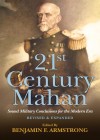Sound Military Conclusions for the Modern Era
Editor: Benjamin Armstrong
Naval Institute Press, Annapolis, 2013. 179 pp
Reviewed By: Jennifer Parker
Benjamin F. Armstrong’s 21st Century Mahan revisits the works of Rear-Admiral Alfred Thayer Mahan, an influential American maritime strategist whose ideas shaped maritime thinking in the late 19th and early 20th centuries – and arguably the 21st. Mahan is best known for the often quoted, yet impenetrably written ‘The Influence of Sea Power Upon History 1783’.[i]
Mahan’s ideas have fallen out of favour with some modern maritime strategists, partly due to the dense and verbose nature of his writing, which can be challenging to engage with. Additionally, his emphasis on concepts such as the ‘decisive battle’ has sparked debate about Mahan’s relevance in the context of modern naval operations, where multi-domain threats, asymmetric warfare, and distributed lethality dominate strategic thinking.
Armstrong’s objective is to bring Mahan back into focus by demonstrating both the breadth of his work and the continued relevance of his ideas for modern military practitioners. In a world increasingly shaped by geopolitical uncertainty, technological change, and a contested maritime domain, Armstrong largely succeeds in making the case for Mahan’s enduring importance.
The book curates five of Mahan’s lesser-known essays, each accompanied by Armstrong’s insightful commentary, offering readers both historical perspectives and contemporary applications. Armstrong’s selections cover topics including naval administration, operational strategy, force deployment, education, and leadership. While Mahan is often remembered for his emphasis on battleships and fleet engagements, Armstrong highlights the broader and often overlooked aspects of his work.
Notably, Armstrong has chosen essays that are relatively accessible and engaging—an intentional move that makes Mahan’s ideas more approachable for a modern audience. Although Armstrong likely could not have predicted the specific relevance of his selections for 2024 Australia when editing the book in 2013, several of the essays resonate with today’s challenges facing the Australian Defence Force (ADF) and Royal Australian Navy (RAN). Mahan’s discussions on naval administration, officer education, and the leadership of British naval figures such as Pellew align closely with the ADF’s current need to shed peacetime bureaucracy. These themes underline the importance of developing a warfighting-focused, purpose-driven, and ambitious defence and naval posture—one that prioritises operational effectiveness over administrative inertia.
Thematic Relevance for Contemporary Strategy
Armstrong’s key argument is that Mahan’s ideas on leadership, strategy, and administration remain relevant, especially for balancing peacetime bureaucracy with operational readiness—an issue that resonates deeply with the ADF and RAN. Like many modern militaries, the ADF operates under constrained budgets, rising operational demands, and the challenges posed by rapid technological change. This makes Mahan’s focus on streamlining administration to maintain combat effectiveness particularly pertinent. His emphasis on reducing bureaucratic inertia parallels Australia’s current efforts to foster a more agile, warfighting-focused defence force.
Armstrong’s commentary is especially timely as the ADF seeks to balance long-term strategic investments—such as those under AUKUS—with the need for more immediate operational readiness. As Australia prepares for potential high-intensity conflict scenarios in the Indo-Pacific, Mahan’s lessons on the importance of decentralising command, empowering officers, and maintaining a clear operational focus offer valuable insights. Armstrong bridges these historical ideas with modern concerns, illustrating how agile decision-making, forward presence, and a combat-oriented culture are essential for maintaining regional influence and ensuring national security in an increasingly contested maritime domain.
Mahan’s ideas on strategic agility—such as positioning naval forces to protect trade routes and maintain presence—resonate in today’s geopolitical environment, where the presence of forward-deployed forces are essential to sustaining influence in contested regions like the Indo-Pacific.
In one essay, Mahan discusses the strategic value of cruisers equipped with wireless telegraphy, a historical example of modifying old platforms with new technology. Armstrong emphasises that modern naval power must remain agile and innovative, capable of adapting to the expanded influence of the cyber, space, and land domains. He argues that navies need to embrace emerging technologies, such as uncrewed surface vessels, while simultaneously developing countermeasures to address evolving and unpredictable threats. This approach highlights the importance of staying ahead in technological advancements and ensuring maritime forces can operate seamlessly across multiple domains to maintain a strategic edge.
Education and Leadership: Lessons for the Future
Mahan’s essays on naval education underscore his belief in the importance of leadership development, combining intellectual rigor with operational competence. He emphasises the need for officers to possess not only technical expertise but also ‘moral power’—a combination of leadership ability and command presence. Armstrong draws connections between Mahan’s views on education and the modern challenge of balancing technical specialisation with broader leadership development.
This theme still resonates as today’s naval institutions focus on preparing officers for complex, multi-domain operations. In an environment where training increasingly takes place in simulators and roles prioritise technical competence, Mahan’s insight remains profoundly relevant: a naval officer must be far more than just a technician. His argument underscores the importance of developing leaders with the intellectual and moral qualities needed to command effectively in uncertain environments. Technical skills are essential, but leadership, strategic judgment, and the ability to inspire and manage people are what ultimately define a successful naval officer.
Mahan’s belief that strategic foresight must complement operational experience is as important in today’s naval operations as it was in 1890. As the nature of warfare evolves, from cyber threats to uncrewed systems, developing adaptable leaders becomes paramount. Armstrong’s analysis reinforces the notion that the ability to lead in uncertain environments remains critical, regardless of technological advancements.
Limitations of Mahan’s Applicability
Despite Armstrong’s efforts to demonstrate the relevance of Mahan’s ideas, some elements of his thinking are inevitably tied to the context of his time. Mahan’s focus on large fleet engagements and capital ships, for example, appears less applicable in an era of asymmetric threats and multi-domain operations. While his strategic principles—such as the importance of naval presence and leadership—remain relevant, his emphasis on battleship-centric strategies is largely outdated. Armstrong acknowledges these limitations, cautioning against directly transplanting Mahan’s ideas into modern contexts without adaptation.
Moreover, Mahan’s geopolitical worldview, shaped by the colonial rivalries of the late 19th century, requires reinterpretation when applied to modern security challenges. Armstrong navigates this by focusing on Mahan’s underlying principles rather than his specific recommendations. For example, while Mahan’s discussions on fleet concentration might not align with distributed maritime operations today, his broader insight—that navies must remain flexible and strategically positioned—remains crucial for modern maritime strategy.
Contribution to Strategic Thought
Armstrong’s 21st Century Mahan serves as both a scholarly resource and a practical guide, not only for naval practitioners but for military professionals more broadly. The structure of the book—each essay accompanied by Armstrong’s analysis—makes it accessible even to those unfamiliar with Mahan’s original works. The concise format, with chapters averaging about 30 pages, ensures that readers can engage with the material without being overwhelmed by historical detail. Armstrong’s approach bridges the gap between academic scholarship and practical military application, encouraging readers to draw lessons from history.
The book emphasises that Mahan’s thinking extends beyond operational tactics to address strategic planning, coalition building, and force sustainability. These themes are particularly relevant for modern navies balancing national defence priorities with multinational commitments. Armstrong’s exploration of Mahan’s work reinforces the importance of integrating historical insights into contemporary defence planning.
Conclusion
21st Century Mahan demonstrates that while some of Mahan’s ideas are rooted in the past, many of his principles remain relevant for today’s military practitioners. Armstrong’s thoughtful selection of essays and insightful commentary provide a valuable resource for officers, policymakers, and scholars interested in maritime strategy. While certain aspects of Mahan’s thoughts are outdated, his emphasis on strategic foresight, operational readiness, and leadership continues to offer guidance for navigating modern maritime challenges.
Armstrong’s work highlights that history is not just an academic exercise but a practical tool for shaping future decisions. As navies, including the RAN, face evolving threats—driven by multi-domain operations, technological advancements, and the proliferation of missile and uncrewed surface and aerial capabilities among non-state actors—drawing on the insights of thinkers like Mahan remains crucial. 21st Century Mahan serves as both a reflection on a great maritime strategist’s legacy and a call to use historical wisdom as a foundation for innovation. For Australia, where strategic competition in the Indo-Pacific intensifies, this blend of historical insight and forward looking strategy is essential in navigating an increasingly complex and contested maritime environment.
Endnotes
[i] Alfred Thayer Mahan, The Influence of Seapower upon History, 5th ed. (New York: Dover Publications Inc., 1890).



